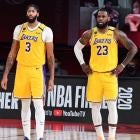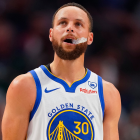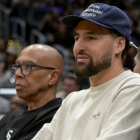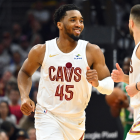
LeBron James knows from past experience that 3-1 leads in the NBA Finals aren't exactly bulletproof. The Miami Heat could get Goran Dragic back for Game 5. They could win without him as they did in Game 3. The series is not technically over. The Los Angeles Lakers remain 48 hard minutes away from a championship.
But as they compete for it, the undercurrent of competition between James and Anthony Davis is undeniably the more interesting story in a series that has largely been one-sided. James has a chance to become the first player in NBA history to win Finals MVP with three different franchises. Davis can become the first teammate of LeBron's to take the trophy from him on the biggest stage.
Two games into the series, Davis held a slim lead. Plenty has changed since then. So where do we stand now, with the Lakers only a game away from the championship? Let's break down their contributions in five key areas to try to identify the current favorite for Finals MVP.
1. Individual scoring
LeBron is scoring slightly more than Davis through four Finals games. Davis is scoring slightly more efficiently. Davis has certainly reached higher heights (as you can imagine, starting a Finals game 14-of-15 from the field isn't exactly common). James has been more consistent, scoring at least 25 points in all four games. Davis has been held below that total twice in a row as the Heat have refocused their defense around rim-protection. The two score at roughly even rates in the first half, though Davis does so far more efficiently (at a blistering 71.4 true shooting percentage). James gets more aggressive in the second half, which creates the points gap, but he also has an edge in every second-half efficiency metric except for 3-point and free-throw percentage.
In other words, the raw numbers here are close, and they're subject to a degree of variance that could very easily swing. We finally saw that in Game 4. Davis made over 50 percent of his mid-range jumpers in the playoffs prior to Tuesday, essentially shooting at unsustainable Kevin Durant-levels over 18 games. He proceeded to go 1-for-6 in Game 4. The raw numbers here aren't as important as the context, which favors James. He is creating his own shots.
Only 37.5 percent of his field goals have been assisted, whereas Davis has been assisted on 67.5 percent of his field goals. LeBron's number is somewhat typical of a modern Finals MVP. Only 38.8 percent of Kawhi Leonard's attempts were assisted in the 2019 Finals, and Kevin Durant even managed to create 55 percent of his own field goals in 2018 despite playing in Golden State's passing-friendly system. The only Finals MVP to be assisted more often than Davis this decade was Andre Iguodala in 2015.
As the playoffs progress, individual shot-creation becomes the single most important trait a lead ball-handler can have. LeBron's scoring is largely defense-proof. The same can't be said for Davis. Games 3 and 4 were proof of that as the Heat fronted the post so aggressively that many of Davis' easy shots disappeared. Remove LeBron from the equation and the Lakers would have no method of late-game scoring. Remove Davis, and James can still cook. That gives the edge here to LeBron.
2. Shot-creation for teammates
If there's an area that isn't close, it's what Davis and James do for their teammates offensively. Davis has improved significantly as a passer during the playoffs. Most teams would be thrilled to get 3.3 assists per game out of their center. But we're comparing him to LeBron James here.
James has created 94 points off of assists. Davis has created 34. That gap should probably be wider. Davis had 13 assists on 20 potential assists, essentially meaning that his teammates are shooting 65 percent off of the shots he's creating. That's not at all sustainable. LeBron has 34 assists on 74 potential assists. A 46 percent rate is far more realistic, and the raw numbers are startling. LeBron's passing is giving his teammates over 18 shot attempts per game, most of them clean. Potential assists have only been tracked since 2014, but it should be noted that the only player ever to post more of them per game in the Finals is... 2018 LeBron James.
The last Finals MVP to lead his team in both scoring and assists not named LeBron was Kobe Bryant in 2009. Points of any variety are extremely hard to come by in the Finals. James both scores and creates them at historically high levels. His overall value to the Laker offense cannot be overstated.
3. Rebounding
The raw rebounding totals here don't matter much in the end. LeBron averages more in large part because the Lakers prefer him to. When another center is on the floor, the Lakers like letting Davis leak out and focus on transition. The issue they've encountered in the Finals is that the Heat defend transition so well that it has hardly mattered. After scoring six points in transition in Game 1, he has a total of four in the past three games. Three of those came as a trailer off of a LeBron rebound.
From that perspective, LeBron's defensive rebounding has had more value. Live-ball rebounds for LeBron are one of the easiest ways for the Lakers, ranked second in transition offense efficiency but 19th in the half-court this season according to Cleaning the Glass, to find points. The Lakers are at their best playing fast, and cutting out the middleman in the transition process helps them do so. Davis' real value on the boards in the Finals has come offensively. He has 14 points off of putbacks against the Heat. Factor in both sides, and this is probably a wash.
4. Defense
Ready for a wild stat? The Heat scored only 92.5 points per 100 possessions with Davis on the floor of Game 4. In the six minutes that he sat, they scored 183.3 points per 100 possessions. That's obviously random variance more than anything, but it's jarring to see on paper. The Heat were essentially twice as efficient offensively when Davis was on the bench. The eye test bore that out to a degree. Jimmy Butler destroyed the Lakers' reserve unit with Markieff Morris at center.
Without hyperbole, Game 4 was almost inarguably the best individual defensive performance in the Finals of the past decade. Davis took on the Butler matchup two nights after Miami's star went for 40 points, and while he wasn't the only Laker to get a crack at him, he was by far the most successful. Butler made only a single field goal when directly matched up with Davis. His primary offensive strategy was to use screens specifically to get away from Davis and beat his weaker teammates off of switches. He did this while also maintaining his typical help responsibilities and serving as the primary Laker rim-protector in a game in which they got only eight minutes out of their other big men. It was a masterpiece so brilliant that it almost overshadows how good he's been on defense for this entire series.
Finals MVP awards have been won on defense before. Iguodala (2015) and Leonard (2014) both earned it for their work on LeBron, which, frankly, was not nearly as impressive as what Davis has done against the Heat. Neither of them scored at nearly the clip Davis has either. Neither faced such stiff internal competition, and it's not as if James is a defensive slouch either. But if James could have handled the Butler matchup as well as Davis has, he would have. LeBron remains a very good defender. Davis, right now, is a great one.
5. On-off impact
Amazingly, the Lakers actually have a better plus-minus with LeBron on the bench than on the floor in this series. They've outscored the Heat by 11 points with him on the floor and 12 with him on the bench, but some of the shooting luck mentioned earlier is baked into that. The Lakers are shooting 40.5 percent from behind the arc when LeBron rests, while the Heat have fallen to 27.6 percent in those same minutes. When Davis rests, however, the Heat have been nine percentage points better on 3-pointers. For all of his many defensive gifts, Davis can't force opponents to miss open shots.
In general, the on-off numbers have largely rested on small-sample variance. The Lakers were outscored by 17 in the first half of Game 3 during Davis' foul-troubled-altered minutes, but won his bench minutes in that same half by 13. Overall, the numbers favor Davis slightly, but not in a way that indicates either holds significantly more value to the team than the other. That isn't surprising. While LeBron's bench minutes were a nightmare for most of the regular season, they've been entirely manageable in the playoffs. The basic principle that the Lakers survive with one star on the floor and dominate with both has held up.
The verdict
Davis held a slim lead after the first two in large part because of his historic efficiency. That has tapered off slightly, and unlike LeBron, Davis has a genuine mark against him in the form of his Game 3 foul trouble. No matter where you stand on the value either provides while on the court, availability is the best ability, and for most of a half in this series, Davis was plastered to the bench. For all we know, that cost the Lakers a sweep. Davis has had higher highs, but much lower lows.
LeBron has been the Lakers' rock, and that is what puts him in the driver's seat for the moment. Moment is the operative word there, because to this point, neither has produced a definitive image or stretch in this series yet. Unlike, say, Kevin Durant's back-breaking 3-pointer in Game 3 of the 2017 Finals, no single play yet stands out as the iconic moment of the 2020 series yet. Clinchers tend to produce such moments, so regardless of what the numbers or the tape say about this series to date, nothing has been decided.
The voting process, historically speaking, is extremely simple. The NBA gives 11 media members ballots in the closing moments of the finale. Voters are human. If they've just watched LeBron ice the series with three or four consecutive buckets, he's going to win this trophy no matter what. If Davis blocks Butler to seal the victory, the trophy belongs to him. The most important game of the series hasn't yet been played, and only when it has will we know who the true MVP of the 2020 Finals will be.


















